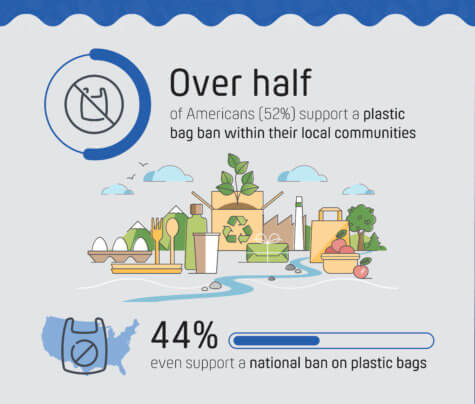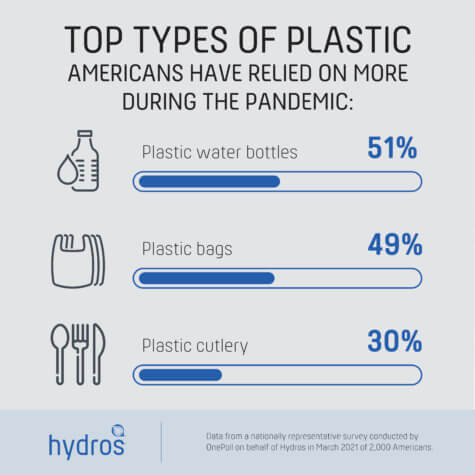NEW YORK — According to a new study, over half of Americans (52%) support a plastic bag ban within their local communities. However, while Americans are talking a big eco-friendly game, many are having trouble living up to it during the pandemic.
A new survey of 2,000 people reveals 69 percent of those who currently live under a plastic bag ban support it. For those who don’t live under a ban in their community, 42 percent say they’d support the introduction of one.
Nearly half the poll (48%) are in favor of plastic bag bans at the state level. Another 44 percent even support a national ban on plastic bags. Yet over a third of Americans (34%) admit that they’ve become “sustainability shirkers” since the start of COVID-19. In fact, 52 percent of respondents say they’re using plastic bags and similarly unsustainable packaging more often than they would like to.
Is being sustainable too hard during a pandemic?
 Conducted by OnePoll and commissioned by Hydros, the study also reveals the other “eco-vices” that have become common among Americans over the last year. Over three in 10 confess to overusing single-use paper products like paper towels.
Conducted by OnePoll and commissioned by Hydros, the study also reveals the other “eco-vices” that have become common among Americans over the last year. Over three in 10 confess to overusing single-use paper products like paper towels.
Roughly the same number admit to using cleaning products with harsh chemicals; likely out of an understandable concern for wanting to keep their homes COVID-free. However, more than one in five respondents reported that they were most likely to express remorse about a different type of eco-vice. Twenty percent say they feel most guilty about increasing their reliance on single-use plastic water bottles during the pandemic.
“Changes in consumer behavior during the pandemic show just how fragile our sustainable habits can be, and make the argument for thoughtfully designed alternatives to single-use plastics that are easy, cost-efficient and enjoyable to use,” says Hydros CEO Winston Ibrahim in a statement.
“That’s why we’re on a mission to make sourcing clean, filtered water at home, work and on-the-go as fast and convenient as picking up a plastic bottle that will more likely than not end up in the ocean or elsewhere in our ecosystem – if not directly, then through leaching of broken-down components of single-use plastics known as microplastics,” Ibrahim adds.
Shifting back to better habits
When it comes to the specific kinds of single-use plastics respondents have become more reliant on during COVID, plastic water bottles (51%) are the number one culprit. Plastic bags (49%) and single-use cutlery (30%) follow closely behind.
 Pandemic shopping sprees – from panic purchasing to boredom buying online – have also taken a toll on Americans’ sustainability efforts. Four in 10 people feel the pressures of the pandemic have led them to purchase from stores and companies whose packaging or shipping practices are known to be wasteful. This comes with an emotional cost as well, as over three-quarters of respondents who have made such purchases say they feel guilty about them.
Pandemic shopping sprees – from panic purchasing to boredom buying online – have also taken a toll on Americans’ sustainability efforts. Four in 10 people feel the pressures of the pandemic have led them to purchase from stores and companies whose packaging or shipping practices are known to be wasteful. This comes with an emotional cost as well, as over three-quarters of respondents who have made such purchases say they feel guilty about them.
In spite of this, respondents are generally optimistic about returning to more eco-friendly habits in the future. Over two in three Americans (69%) say they have a plan for getting back on track. As for the specifics of those plans, about half (46%) plan to gradually phase out their unsustainable habits as things return to “normal.”
“What many people don’t realize is that they can make the biggest impact on climate change by voting with their wallets – that is, by supporting products that do not produce single use waste, and by monitoring their household’s habits,” Ibrahim explains.
“These small changes can produce incredible and readily actionable outcomes. In this sense, consumers have the power to move faster, and make a bigger upfront difference, than slow regulatory and political processes.”
